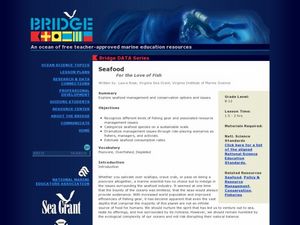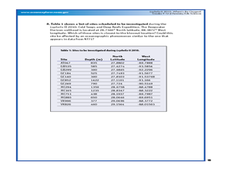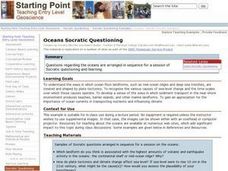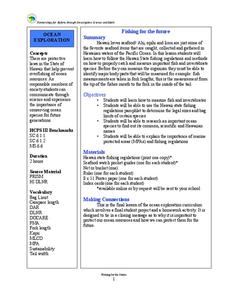National Wildlife Federation
The Amazing Adventures of Carbon: How Carbon Cycles through the Earth
Here's a stat for your pupils: 18 percent of the human body is carbon! Part 10 in the series of 12 takes pairs on an adventure through the carbon cycle. After a class reading about carbon, pairs read and choose their own adventure...
Teach Engineering
Extinction Prevention via Engineering
It's time to save endangered species through engineering. The third lesson in a nine-part Life Science unit has young environmentalists study species extinction. An engaging discussion leads to some ideas on how to use engineering design...
EngageNY
TASC Transition Curriculum: Workshop 9
Here's a workshop for teachers that rocks the academic world! Using earthquakes as a medium for instruction, educators learn about crosscutting engineering with science. Fun, hands-on, collaborative exercises encourage participants to...
EngageNY
Modeling an Invasive Species Population
Context makes everything better! Groups use real data to create models and make predictions. Classmates compare an exponential model to a linear model, then consider the real-life implications.
Curated OER
Create an Underwater Scene
Students apply knowledge of underwater ocean life by creating an ocean life scene with marine animals and plants placed at appropriate ocean depths.
Curated OER
Discovering the Deep
Young scholars explore the world's oceans. They research questions about the oceans and write a research report about an ocean animal. Students identify at least four different writing genres they experienced while reading about the ocean.
Curated OER
Life of An Island
Learners identify the steps in the life cycle of an island. They label islands in the correct stage of their life cycle and illustrate the process themselves. They also review the concept of plate tectonics.
Curated OER
Estuarine Currents
Learners explore an estuarine system to gather data on density driven currents. This type of current is contrasted with temperature and wind driven currents.
Curated OER
Leaving Home
Students explain the importance of larval dispersal and retention to populations. They collect data on organisms and examine it.
Curated OER
Creative Writing - I AM A FISH
Ninth graders write a letter to the editor about the impact of people on marine life from the point of view of a fish.
Alabama Learning Exchange
Action at Plate Boundaries
Students diagram the spreading of the ocean floor. In this earth science lesson plan, students read an article on plate boundaries of the ocean. Students are expected to diagram the oceanic convergent boundary, and...
Curated OER
"Sea" Me Race
Third graders explore the ocean habitat. They race each other while portraying a different creature of the sea. They research various types of creatures found in the sea and portray that creature while racing classmate.
Curated OER
Oceanography Research
Fifth graders locate information on a specific ocean animal using encyclopedias, nonfiction books, SIRS Discoverer, multimedia encyclopedias, and the Internet. They create an acrostic poem about the ocean animal they have been researching.
Curated OER
Light Up the Deep Sea
Students simulate bioluminescence in the marine environment. In this marine science lesson, students investigate how animals in the deep ocean communicate with each other. They explain the function of bioluminescence among marine organisms.
Curated OER
The Magic School Bus Goes to Mussel Beach
Learners participate in a hands-on activity where they explore tidal zones. They explore tides and marine life. This is an experiment that can be accomplished in class.
Curated OER
Seafood: For the Love of Fish
Students role play a scenario specific to decision making in seafood management and conservation. In this marine science lesson, students estimate seafood consumption in their state. They recommend new regulations for better fishery...
Curated OER
Harmful Algal Blooms in Full Bloom
Students calculate the total percentage of samples from the data on the graphs. In this marine science instructional activity, students analyze the concentration levels over a period of time. They suggest ways to lessen the effect of...
Curated OER
Pipeline to the Coral Reefs
Pupils discuss the relationship of density to stratification. In this marine science lesson, students create a model of upwelling events using cold and warm water. They discuss how water phenomena affect coral reefs.
Curated OER
Oceans: True or False?
Students take a true or false quiz to test their knowledge of oceans and ocean life, and research various Internet websites to locate the answers to the quiz questions.
Curated OER
A Bioluminescent Gallery
Students examine the different types of luminescence in deep sea organisms. In this bioluminescence lesson, students investigate how color and light aide deep ocean organisms by describing the characteristics of the habitat and...
Curated OER
Structure of Earth
Seventh graders study and make a model of the significant formations of the ocean floor. They examine images and illustration and apply their imagination while creating the model. They are challenged to complete further research as an...
Curated OER
Where's the Oxygen?
High schoolers study seawater and how temperature and salinity influence it. In this oxygen lesson students complete a lab activity on dissolved oxygen.
Curated OER
Oceans Socratic Questioning
High schoolers participate in a whole class discussion of ocean-floor structures and plate tectonics. They respond to prompts in a structured sequence that lead them to conclusions about the role of plate tectonics in the creation of...
Curated OER
Fishing for the Future
Students research Hawaii's fishing regulations. In this conservation lesson, students explore the reasons behind ocean conservation. Resources are provided.

























